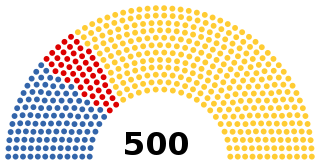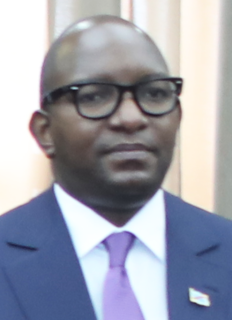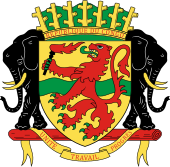
A senate is a deliberative assembly, often the upper house or chamber of a bicameral legislature. The name comes from the ancient Roman Senate, so-called as an assembly of the senior and therefore considered wiser and more experienced members of the society or ruling class.
The chamber of deputies is the lower house in many bicameral legislatures and the sole house in some unicameral legislatures.

The president of the Democratic Republic of the Congo, is the head of state of the Democratic Republic of the Congo and commander-in-chief of the armed forces.

The Republic of the Congo elects on national level a head of state - the president - and a legislature. The president is elected by the people. The Parliament (Parlement) has two chambers. The National Assembly has 153 members, for a five-year term in single-seat constituencies. The Senate (Sénat) has 66 members, elected for a six-year term by district, local and regional councils. The Republic of Congo is a one party dominant state with the Congolese Labour Party in power. Opposition parties are allowed, but are widely considered to have no real chance of gaining power.

The Parliament of the Democratic Republic of the Congo consists of two chambers:

Article 2 of the Constitution of the Democratic Republic of the Congo divides the country into the capital city of Kinshasa and 25 named provinces. It also gives the capital the status of a province. Therefore, in many contexts Kinshasa is regarded as the 26th province.

The National Assembly is the lower house of the bicameral Parliament of the Republic of the Congo. It has 151 members, elected for five-year terms in single-seat constituencies.

The National Assembly is the lower house and main legislative political body of the Parliament of the Democratic Republic of the Congo. It was established by the 2006 constitution.

The prime minister of the Democratic Republic of the Congo is the head of government of the Democratic Republic of the Congo. The Constitution of the Third Republic grants the Prime Minister a significant amount of power.

The Government of the Democratic Republic of the Congo is the second institution in the central executive branch of the Democratic Republic of the Congo, the first institution being the President, who has the title of head of state.
The legislatures of communist states included:
Kamina Airport is an airport serving Kamina, a city in Haut-Lomami Province, Democratic Republic of the Congo.

Republic of the Congo–Russia relations refers to bilateral foreign relations between the Republic of the Congo and Russia. The Republic of the Congo has an embassy in Moscow. Russia has an embassy in Brazzaville.

The first elections to the Representative Council of Moyen-Congo were held between December 1946 and January 1947. A government decree, issued on 26 October 1946, had called for the holding of elections for Representative Councils in each of the territories of French Equatorial Africa.

This national electoral calendar for 2012 lists the national/federal direct elections that were held in 2012 in all sovereign states and their dependent territories. By-elections are excluded, though national referendums are included.

The Constitution of the Republic of the Congo is the basic law governing the Republic of the Congo. In it, it is stated that the Republic of the Congo is a pluralistic, multi-party democracy. A presidential system since 2009, the president's term was originally 7 years, which has now been reduced to five after a 2015 constitutional referendum that instituted a new Constitution, which also reinstated the position of Prime Minister and moved the country to a semi-presidential system. The Council of Ministers – the government – is appointed by the President.

Jean-Michel Sama Lukonde Kyenge is a Congolese politician from the former Katanga Province who has occupied the role of Prime Minister of the Democratic Republic of the Congo since 15 February 2021. He was named the day of the 2021 Congo River disaster. He announced his cabinet on 12 April 2021. He is a member of the Future of Congo party.

General elections are expected to be held in the Democratic Republic of the Congo in 2023.












